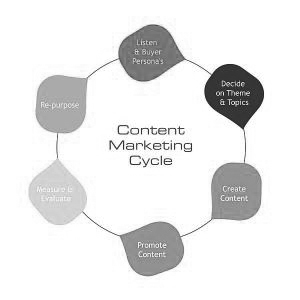 Brands have discovered a way to become more humane and interact more intimately with customers : marketing with content. A few years ago, you would have considered a product as a commodity and a company as a provider. Today, we want to interact with our favorite brand’s full eco-system of products. We are happy to be brand ambassadors, recommending products and services to family and friends. This change, in part, has been facilitated through content. Companies have realized that good content sells better than the best advertising messages and television ads they can come up with. To give you a perspective, over 27 million pieces of content are shared on the web.
Brands have discovered a way to become more humane and interact more intimately with customers : marketing with content. A few years ago, you would have considered a product as a commodity and a company as a provider. Today, we want to interact with our favorite brand’s full eco-system of products. We are happy to be brand ambassadors, recommending products and services to family and friends. This change, in part, has been facilitated through content. Companies have realized that good content sells better than the best advertising messages and television ads they can come up with. To give you a perspective, over 27 million pieces of content are shared on the web.
What’s the big deal with branded content?
Content builds trust by giving customer what they want. Say you’re looking to lose weight through diet supplements. A fitness supplements company with a well-defined content marketing strategy has a blog that gives you useful advice on exercises that complement diets to maximize weight loss. You can download an ebook on weight-loss management from their website. They have YouTube ‘before’ and ‘after’ videos with testimonials and tips from customers who have successfully used the diet pills. Their Facebook and Twitter pages have links to nutritious recipes, and proprietary case studies. That’s a lot of information you can put to practical use. You’re hooked; the company is now your go-to resource to meet your weight loss goals. No matter how effective the diet pills may actually be, you now trust the company and feel empowered by it.
Today’s savvy consumers are more inclined to trust brands that communicate openly and usefully through content than those that merely wow them with compelling advertisements. By facilitating the sharing of proprietary knowledge, content marketing has enabled brands to establish expertise, provide greater transparency, and effect meaningful change in customers’ lives. Companies are increasingly using content marketing in conjunction with search engine optimization (SEO), a process to increase web traffic and improve search engine rankings, to take customer engagement to new heights.
B2C and B2B marketers are leveraging the power of branded content
The latest statistics from Content Marketing Institute reveal that 90% of B2C marketers are using content marketing and 60% have a documented content strategy. 44% of B2B marketers have a documented content strategy, and 73% have someone in charge of overseeing content marketing efforts. Both big brands and small players are stepping up their content marketing game and investing their time publishing diverse types of content. The likes of HubSpot and American Express have created actionable, educational content that’s helpful to their audience.
Brands have become their own publishing houses
2014 started out as the year of content marketing hires with Yahoo signing on veteran television journalist Kate Couric to its editorial team. USA Today’s Michelle Kessler and former journalist Hamish Mckenzie are leading the content efforts at Qualcomm Spark and Tesla Motors. One brand that’s become a bona fide publishing empire and regarded as a content marketing superstar is Red Bull. Its content strategy has really given wings to creative and thrilling ideas that are marketed smartly on social channels.
Content is king in the perpetually connected world of digital media. By investing in quality branded content, you can build a powerful brand and occupy a place of value in your customers’ minds.
Photo by Ingrid Archer / Creative Commons 3.0 Unreported